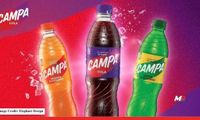In a dramatic turn of events, the soft drink market in India is witnessing a fierce resurgence of competition as Reliance Industries revives the iconic Campa Cola brand, once a household name in the 1990s. This revival is not merely nostalgic; it represents a strategic maneuver that is shaking up the industry, particularly against the backdrop of Coca-Cola and Pepsi’s longstanding dominance.
The reintroduction of Campa Cola comes with a price point that’s hard to ignore. Launched at a mere ₹10 for a 200 ml PET bottle, this pricing strategy is half that of its competitors, Coca-Cola and Pepsi, which is a significant move in a price-sensitive market like India. This strategic pricing has allowed Campa to quickly gain traction, reportedly crossing ₹1,000 crore in revenue within just 18 months of its relaunch.
Reliance has not only focused on pricing but has also recalibrated its retail strategy. By offering retailers margins of 6-8%, compared to the 3.5-5% typically provided by global rivals, Campa Cola has managed to secure prominent shelf space in over 18,900 stores across the country. This aggressive retail strategy has allowed the brand to penetrate not just urban centers but also Tier II and Tier III cities, as well as rural markets, which are often overlooked by larger brands.
The marketing approach for Campa Cola has been equally strategic. Instead of bombarding the market with high-budget advertising campaigns, Reliance has opted for a more subtle yet effective strategy by securing the co-presenting sponsorship for IPL 2025 at ₹200 crore. This move has ensured that Campa Cola is front and center during one of India’s most-watched entertainment events, enhancing its visibility and brand recognition.
Meanwhile, the competitive landscape is shifting. As Campa Cola makes its mark, industry giants Coca-Cola and Pepsi are responding by slashing prices and bundling offers in an attempt to retain their market share. However, their actions appear reactive, as Reliance continues to lead the narrative in this evolving market.
In addition to its strategic pricing and marketing, Reliance is also expanding its product portfolio around the ₹10 price point. New products such as RasKik, a ₹10 glucose drink, and Spinner, a ₹10 sports drink co-developed with cricket legend Muttiah Muralitharan, are set to further establish Reliance’s foothold in the FMCG sector. This approach mirrors the company’s previous success in the telecom sector, where it disrupted the market with ultra-cheap data plans and free calls.
On the production side, a new Campa Cola manufacturing unit is being established in Jamalpur, Muzaffarnagar, with an investment of ₹600 crores. Chief Secretary Manoj Kumar Singh inspected the site on April 7, 2025, noting that the project will create about 500 jobs and produce approximately 60 crore bottles of Campa Cola annually. This facility is a joint venture between Reliance and Bhartiyam Beverages Private Limited, and it represents a significant boost to local employment and industrial development in the region.
As the Campa Cola brand gears up for a major comeback, it’s essential to consider the historical context of its initial decline. Back in 1977, Coca-Cola was ousted from India due to government policies favoring domestic industries, which led to the creation of alternative brands like Double Seven. Although Campa Cola was once a major player, it faded into obscurity as new competitors emerged.
However, the current landscape is markedly different. The Indian market for non-alcoholic beverages is projected to reach ₹1.47 lakh crore by 2030, up from ₹67,100 crore in 2019. This growth is driven by increasing health consciousness among consumers, which has led to a surge in demand for sugar-free and low-calorie beverages. Both Coca-Cola and Pepsi are now introducing diet versions of their drinks at competitive prices, a move that could reshape the landscape further.
With the return of Campa Cola, the soft drink industry is shifting from a binary competition between Coca-Cola and Pepsi to a more complex, multifaceted rivalry. The entry of Reliance and its ambitious plans for Campa Cola could herald a new era in the beverage market, where domestic brands can compete on equal footing with multinational corporations. As the market dynamics evolve, the question remains: can Campa Cola sustain its momentum against the formidable forces of Coca-Cola and Pepsi?
In conclusion, the revival of Campa Cola is not just about nostalgia; it’s a significant disruption in the FMCG sector, reflecting broader trends in consumer behavior and market dynamics. As Reliance continues to innovate and adapt, the soft drink market in India is set for an exciting transformation.









